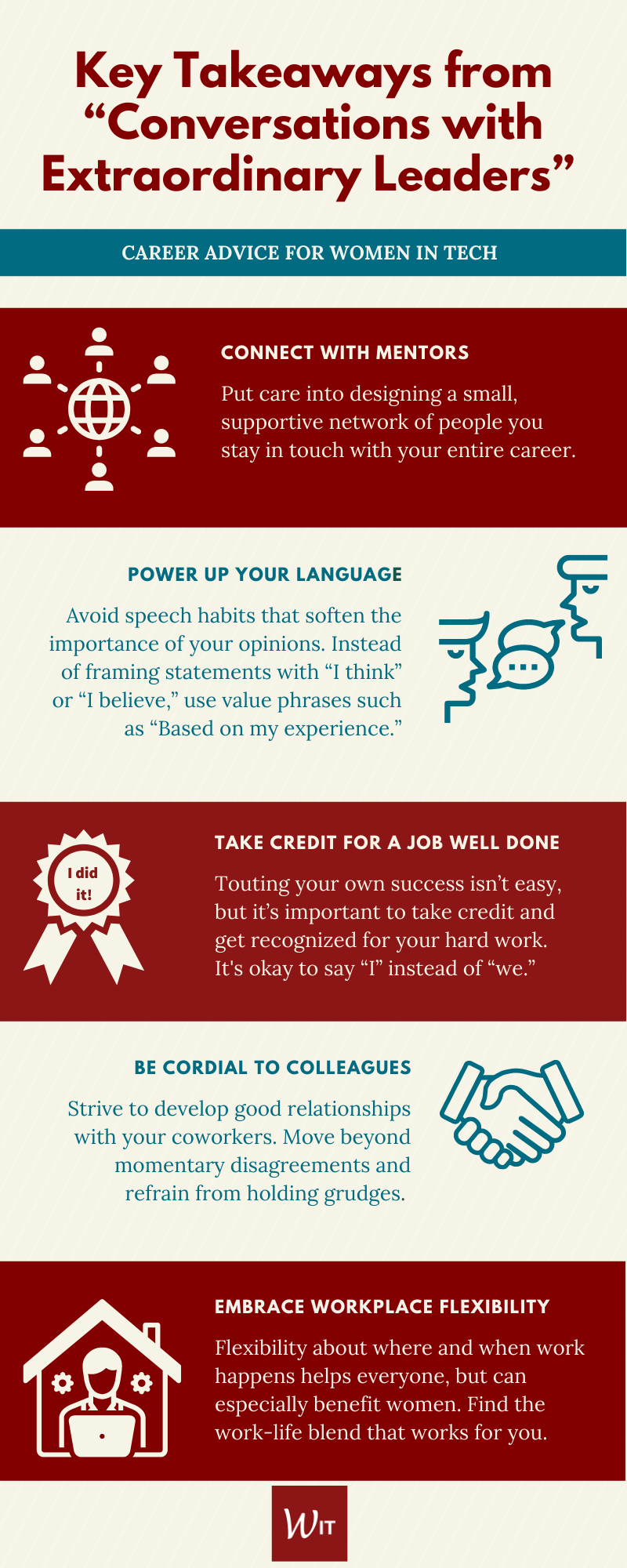Extraordinary leaders have extraordinary personal journeys — often with many valuable insights gained along the way.
On Feb. 17, two such leaders, Anne Margulies, vice president and chief information officer at Harvard University, and Tracy Futhey, vice president and chief information officer at Duke University, shared their journeys during the kick-off of the new event series titled “Conversations with Extraordinary Leaders.”
The virtual event was co-sponsored by Stanford Women in Technology (WIT), Harvard WIT+Allies, and Duke DiversifyIT. Stanford Chief Information Officer Steve Gallagher moderated the conversation.
Anne and Tracy, the only two women currently serving as CIOs among the Ivy+ Universities, acknowledged that women are underrepresented in IT. Today, only 25% of IT professionals are women. The stats for higher education are slightly better with women making up 28% of IT leadership positions.
“The stereotypes for people working in IT are, unfortunately, sometimes accurate. And they’ve made it frankly, unappealing and often unwelcoming for women to work in IT,” Anne said.
“It’s a hard job, and it’s harder to do when you don’t see other people like you out there doing the job,” Tracy said.
Many different paths to becoming a CIO
While both women are now technology leaders at esteemed universities, their paths leading up to the role were quite different.
Tracy took a summer consulting job with Carnegie Mellon, teaching educators how to use computers and helping high school students learn to program. That first job led to another and another and another, and she eventually worked her way up to CIO at Carnegie Mellon. A few years later, Duke called and offered Tracy the CIO position.
“I tend to think people get where they are through some combination of talent and luck. I had a couple of lucky twists of fate along the way,” Tracy said.
Anne started her career at AT&T working in marketing and sales. “When I started my career, CIOs didn’t even exist yet,” she said.
Anne worked 12 years at Harvard, mostly in IT jobs. After leaving Harvard in the 90s, she took a detour and became executive vice president of a leading public affairs and communications company. Next, she went to Massachusetts Institute of Technology, where she developed the OpenCourseWare program. Convinced it was her time to do public service, Anne became CIO for the Commonwealth of Massachusetts before returning to Harvard as CIO in 2010.
Tackling diversity
During the event, Anne and Tracy acknowledged the challenges faced by women leaders in higher education IT. Both have worked hard to implement strategies to address gender balance and build stronger, more inclusive IT teams.
“You can’t just say you tried. That’s not good enough. Where at your university is, ‘We tried,’ ever good enough? There are diverse candidates out there and certainly women,” Anne said.
At Harvard, job descriptions were revised to include the university’s values and gender-coded language was removed. Duke makes sure interview teams include diverse representation.
“I keep looking for a shortcut or a silver bullet, but unfortunately, it’s a lot of things you have to do for it to really add up to making a difference,” Tracy said.
Women in tech: Key takeaways
Throughout the program, Anne and Tracy shared practical advice for women seeking a successful career in technology. Here's a summary of some key messages. You can also view the event recording.

Key Takeaways from Conversations with Extraordinary Leaders. Career advice for women in tech.
Connect with mentors
Put care into designing a small, supportive network of people you stay in touch with your entire career.
Power up your language
Avoid speech habits that soften the importance of your opinions. Instead of framing statements with "I think" or "I believe," use value phrases such as "Based on my experience."
Take credit for a job well done
Touting your own success isn't easy, but it's important to take credit and get recognized for your hard work. It's okay to say "I" instead of "we."
Be cordial to colleagues
Strive to develop good relationships with your coworkers. Move beyond momentary disagreements and refrain from holding grudges.
Embrace workplace flexibility
Flexibility about where and when work happens helps everyone, but can especially benefit women. Find the work-life blend that works for you.

